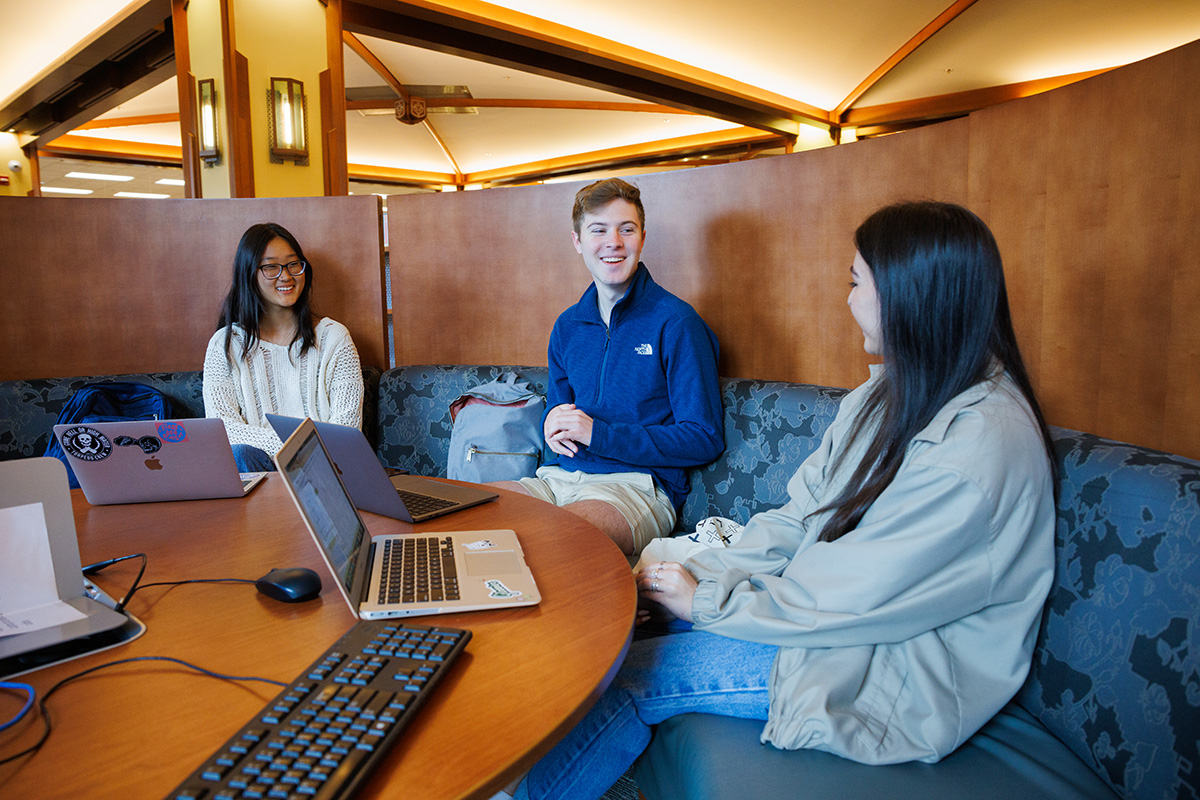 DePaul's library resources support student learning across modality, time or place. (Photo by Joe Gaylor)In this article:
DePaul's library resources support student learning across modality, time or place. (Photo by Joe Gaylor)In this article: - The university library serves the entire community in many ways wherever they may be, whether online or on campus.
- Besides being a repository for books, the library helps answer research questions, provides research question consultation, and delivers instruction sessions and presentations.
- The library also offers loanable technology, albums, solo booths and more.
- Research databases and “Ask a Librarian” are two online resources for the community.
- Read on to learn about even more library resources.
The sudden shutdown of DePaul’s Lincoln Park and Loop campuses in March 2020 due to the COVID-19 pandemic brought into sharp focus the need for all university offices to better support remote learning. Fortunately for the DePaul University Library, many of its resources, such as its research databases and “Ask a Librarian” support, were already available online.
Fast forward to the present and the library’s strategy of serving students “wherever they may be” has become even more apparent. Students value having options for access and engagement, all supported by the library’s dedicated team of experts.
“In some ways, we think of the library as a reliable operating system, quietly running in the background, powering student success,” says Rob Karpinski, associate vice president for Academic and Library Affairs Administration. “Whether a student is using a solo booth in Richardson for a job interview or chatting online with a librarian from home, we’re here to best support our students.”
Visitor traffic
The value of the University Library can be demonstrated in part by increasing visitor traffic and circulation of printed materials:
- Gate counts for the John T. Richardson Library on the Lincoln Park Campus continue to increase from pre-pandemic levels. With over 56,000 visitors, there were more visits to Richardson in Sept. 2024 than in Sept. 2019.
- The Loop Library had just over 18,000 visitors in the same month.
- In addition, the total circulation of print materials rose 39% from fiscal year 2023 to 2024.
Research questions and consultations
Core to academics, research is happening in every corner of the university, and the library supports this activity in many ways. These include research questions and consultations. In academic year 2023-2024:
- The library answered nearly 11,000 research questions in person and online, a slight increase from 2023.
- The library also held more than 500 scheduled, in-depth individual research consultations.
Instruction sessions and presentations
In the 2024 fiscal year:
- The library provided 357 instruction sessions and presentations to courses in programs across the university.
- Instructions and presentations in Special Collections and Archives grew 25% from 2023. This included providing students with the opportunity to engage with primary sources pulled specifically from the library’s archives for the session.
Talia Bianchi, a senior history major who is currently writing her honors thesis, says the library staff has been invaluable to her research.
“The staff are always incredibly kind and helpful and are always excited to hear about your project,” Bianchi says.
Amberlee Webster, an MEd student and graduate assistant in the College of Education’s counseling and community mental health program, echoes that sentiment.
“In my classes, I consistently use the library as a resource for my research papers and in looking for evidence-based practices,” Webster says. “In my work as a graduate assistant, I am in constant use of the library to discover resources for projects I am working on with professors or using the librarians as a sounding board.”
Supporting the master’s in professional communication
The Master of Arts in professional communication program is a fully online, accelerated program for rising communication leaders. Students start the program with a virtual orientation, and reference and instruction librarian Kaiya Schroeder, a liaison to the College of Communication, visited virtually with the new graduate students and introduced them to online library resources.
“The online library resources were user-friendly, and I found relevant information for my research,” says Anita Malone, a graduate of the professional communication program. “As an online student, the best feature to me was the ability to reach a team member in real time when I needed help or needed a question answered.”
The libraries are for everyone!
The University Library is here for all members of the DePaul community – across modality, time or place. Moreover, it’s poised to help across disciplines, fields and majors.
“It will always be important to maintain central places that support the academic aspirations of students across departments,” observes Honor Allen, an MEd student and graduate assistant in secondary English education.
Professors Ragas, Donovan and Opitz serve on the Library Review Board (LRB), a university committee with faculty representation from across the university community.